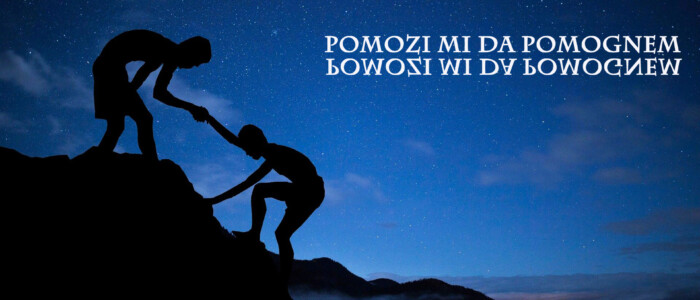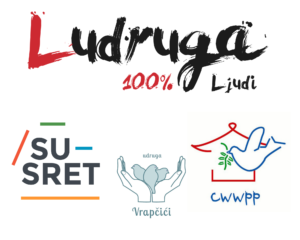
Help Me to Help You
It is the beginning of a New Year. Enthusiasm is growing, ideas are piling up for elaboration, everything is full of possibilities. We, of course, started the New Year with enthusiasm and a new project that is already in full swing:
HELP ME TO HELP YOU - POMOZI MI DA POMOGNEM
Our partners in the project are: the Association for Psychosocial Assistance "SUSRET" from Zagreb (Udruga za psihosocijalnu pomoć Susret), the Association for the Improvement of Mental Health "Vrapčići" from Slavonski Brod (Udruga za unaprjeđenje mentalnog zdravlja „Vrapčići“) and Stichting Coalition for Work with Psychotrauma and for Peace from Vukovar (Stichting koalicija za rad sa psihotraumom i za mir).
We have joined forces to expand the network of psychosocial peer support in the community for people with psychosocial disabilities and their families by promoting examples of good practice and training to provide peer support in the process of recovery and social inclusion.
The biomedical approach to mental health care prevails in Croatia and there is no system of community mental health care, nor a system of support for people with psychosocial difficulties after their hospital treatment, or a system that will prevent hospitalization and various forms of coercion against members of this vulnerable group.
According to data from the Croatian Register of Persons with Disabilities (OG 64/01), mental disorders are the most common type of impairment. In some counties where the project will be implemented, according to the type of impairment, mental disorders make up a quarter of the total number of PWDs: in DNZ they make up 25.2%; SPD 32.8%; BPJ 22.8%; VSŽ 33.8%; ZŽ 20.3%; ZG 20.6%. These data show that there is a great need to provide psychosocial support to vulnerable groups. In its 2001 Health Report, the World Health Organization emphasized that all mental health services for children and adults should be integrated into general health and social services in the community in order to achieve a cost-effective health care system that respects human rights.
The implementation of the project Help Me to Help You provides an opportunity to share information and learn about modern methods of mental health care in communities that focus on the role of the individual in their own recovery. Recovery means that a person with psychosocial difficulties learns to use their own capacities again, and isolation and social exclusion do not help them at all. On the contrary, the community plays a key role in the recovery process by creating an adequate care network, which, in addition to psychosocial health professionals, includes family members and friends, as well as peer experts.
The project is designed as a collage of carefully planned activities that will connect all partners in the project as well as participants and beneficiaries in all counties in which the associations operate.
Project activities:
- Training for Peer support group facilitators, which is designed as a series of experiential exercises based on real situations from already existing Groups, in order to experience group dynamics. After that, the facilitators will be able to independently conduct peer support groups with constant consultations and supervision of experts from the main association of the project and from and partner associations;
- Peer support groups for people with psychosocial disabilities and their family members - People with psychosocial difficulties from the Groups get a safe and protected place where they can meet others who are going through similar life experiences, share with others what they are going through - thoughts, feelings, issues that bother them, and support each other. Through their Groups, their family members learn about the needs and possibilities of the vulnerable family member, gain insight into their own, often disturbed mental state, and learn how to improve relationships that are an aggravating factor in the recovery of people with psychosocial difficulties;
- Consultations for Peer support group facilitators - The consultants talk to the facilitators of the Group about the different situations that happened in the Group, about the reactions of the facilitators to those situations and together find solutions for specific situations;
- Workshop for creating a personal recovery plan and training for peer experts - Personal recovery plan (WRAP-Whole Recovery Action Plan). WRAP is an innovative tool for dealing with one's own psychosocial difficulties. It implies a detailed insight into one's own mental state, the triggers that lead to the development of psychosocial difficulties, the possibility of preventing them;
- Professional psychotherapeutic consultations for peer professionals;
- Professional supervision for peer experts;
- CARe education includes educational workshops on methodology and principles (Comprehensive approach to rehabilitation) intended for professionals by profession (social workers, psychologists, social pedagogues, etc.). Experts get acquainted with CARe recovery-oriented work methodology , how to approach and empower a person and make an assessment of strengths, how to turn a person's vulnerability into strength, work with the environment, etc. The knowledge and skills acquired by experts will be applied in their work after the project. Educating staff, which leads to an increase in their competencies, reduces stress and prevents burnout syndrome.
You will find all the information on all project activities (initiatives, workshops, group meetings) on the LUDRUGA website - ludruga.hr and social networks.
Project activities are implemented with the financial support of the Ministry of Health of RH. The content of the documents is the sole responsibility of the association and under no circumstances can it be considered as a reflection of the position of the Ministry of Health of RH.


